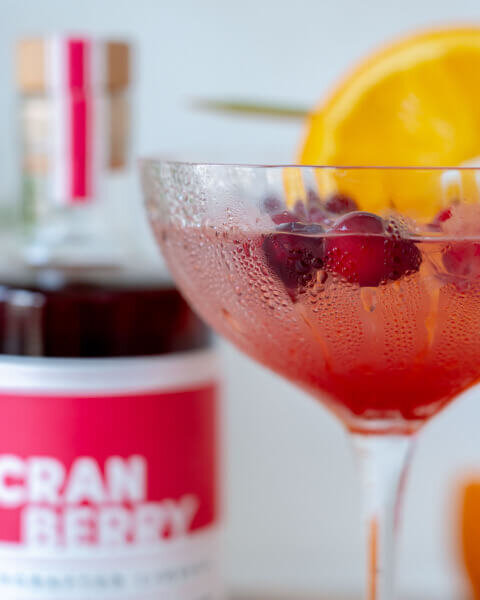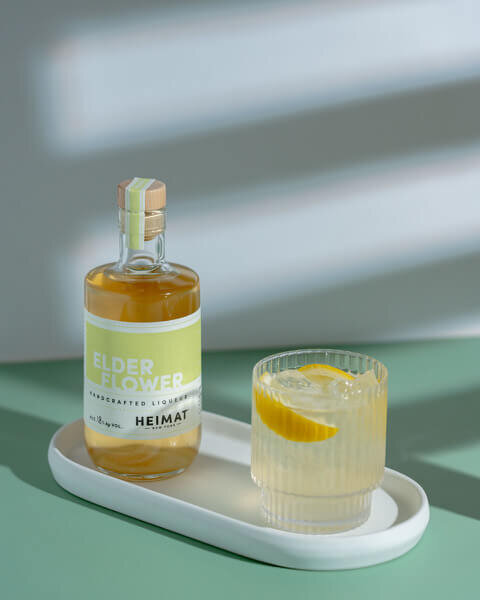How Heimat New York Liqueurs Perfectly Blend Hyperlocal Fruit and Heritage German Techniques
Ute Londrigan credit Justine Knight Photography
Growing up in Geldern, a small town in Germany near Dusseldorf and the Netherlands border, Ute Londrigan made liqueurs with her mother using her grandmother Maria's recipe. As an adult Londrigan steeped batches as holiday gifts just for fun. When she and her family moved to New York's Hudson Valley in 2015, she continued the tradition to stay connected to her homeland. But that hobby eventually led to the founding of Heimat New York, a line of sourced locally and handmade craft liqueurs.
Starting the Company
With word spreading and people stopping her on the street to ask to buy a bottle. Londrigan decided to turn her hobby into a business. She had a background in packaged foods and drinks marketing and had always wanted to own her own company and to see her product on a store shelf.
For two years, she tinkered with various produce and the recipe, established connections with farmers throughout the state, and set up the business. She launched Heimat New York with five flavors including white peach and pear in November 2018. Elderflower was released in July, bringing the line to eight.
The raspberry and rhubarb spirits have received gold medals at the USA Spirits Rating; cranberry was recently awarded Best in Show at the International American Spirit competition.
Making Cocktails
Londrigan aims to show drinkers that they can make simple, delicious cocktails at home easily with just a few ingredients. "Some people are still kind of afraid of making cocktails, for gatherings, for example," she says, adding that the large number of ingredients often found in cocktails, choosing what to make and how to make it, is daunting. Londrigan recommends mixing a liqueur with Prosecco or dry white wine, adding to a gin and tonic or mojito, or combining with seltzer or club soda to imbue a spritz. She says her grandmother enjoyed her liqueur neat and always after coffee.
A Family Heritage
Londrigan says food played a big part in her life growing up. It was traditional in Germany to make berry and peach liqueurs to ensure the taste of fresh fruit throughout the winter. Her grandmother's recipe, on which the liqueurs are based, is at least 100 years old. Londrigan's versions also derive their distinctive flavors from her use of locally grown produce and flowers. "There is so much more flavor in the local fruit when you pick up a nectarine here from New York instead of something from California which has been on the plane for so long, the flavor is different," she says.
Hence the company's name Heimat New York; heimat, a German word which loosely translates into homeland; and New York, because the business is licensed as a farm distillery in the state. "It's where your roots are, when you close your eyes and think about where you're from, your mom's cooking, the smell of the forest, all your senses," explains Londrigan, describing what heimat means to her. "Our homeland here is New York," she says. "There's so much out here, so many beautiful fruits, and so many amazing farmers."
And while the spirits trace their roots back to her homeland, Londrigan has infused them with a bit of America. Cranberry, for example, isn't grown in Germany.
It’s the Fruit
What sets Heimat New York's liqueurs apart is that they're produced using the whole fruit, rather than juice. Londrigan likens the taste to "biting into the full fruit." She distills using a neutral spirit made locally for the company and adds organic cane sugar (sourced outside New York because it is not produced there) as the third and only additional ingredient. She's careful not to add too much sugar. "You don't want to have it {the liqueur} heavy on a tongue. You want it to be fresh and nice," she explains. Perfecting the rhubarb recipe took two years.
One of Londrigan's favorite parts of the business is the collaborative relationships she's developed with farmers. They leave her fruit on trees and bushes longer for the most flavor and decide when it's time to harvest. One elderly farmer with German roots planted100 blackberry bushes for her; another gave her a box of nectarines and persuaded a reluctant Londrigan to make a test batch. Surprised by the results, she added the flavor to the line.
Time is of the essence once the fruit, flower, or vegetable (rhubarb is a veggie) is harvested. Londrigan picks up the produce, and the race is on. Elderflower goes into the tanks in her facility in Mamaroneck, New York, mere hours after it is picked to ensure the full effect of the flower. Stone fruits and berries are put in within two days. She makes a few trips to pick up blackberries as bushes do not ripen uniformly. "Harvest time is long," she says.
"Another thing which I love about our products is every year tastes different," says Londrigan. "We use the same recipe for each fruit, but Mother Nature treats the fruit every year so differently," she adds, noting her appreciation for what farmers go through and how she too must adjust. She emphasizes that using the same base recipe ensures quality.
One year the rhubarb harvest produced less juice and the liqueur was darker and stronger than in the year before or after. "It's like a wine. It's simply your vintage," she says. "I think that's the fascinating fact about it because if I would work with juice, I could make the exact same product each time, but it's not the same flavor, not the depth you get from whole fruit."
Despite the raspberry crop being destroyed this year due to rain and insects, Londrigan was able to produce more of her other liqueurs to compensate. With the introduction of elderflower, production more than doubled this year, to 1000 thousand bottles or more of each variety.
Looking Ahead
Future plans include versions featuring other stone fruit and nuts and experimenting with different techniques. For the holidays, Heimat New York will release limited editions of cranberry liqueur aged in bourbon barrels, and a Bosc pear liqueur finished in rye barrels. The distillery has outgrown its space, so Londrigan is looking for a larger one, which will include room for tastings post-Covid.
Sharing her family recipe through the company is "quite fulfilling," shares Londrigan. "Every single day when I'm working, I'm thinking of my home (my heimat) in Germany," she comments. "Thinking about my mom, old memories. Heimat New York is a very personal way to share something that means so much to me."




